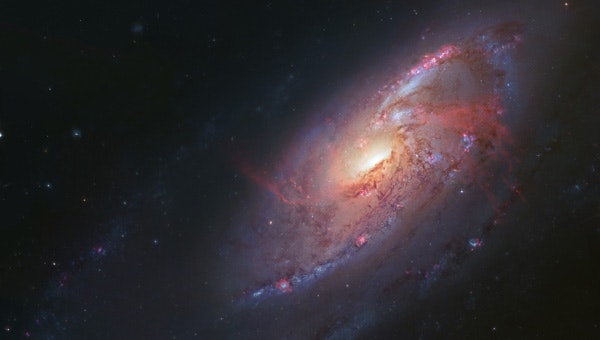
An introduction to modern astronomy's most important questions. The four sections of the course are Planets and Life in The Universe; The Life of Stars; Galaxies and Their Environments; The History of The Universe.
What's inside
Syllabus
Are we alone in the Universe?
Planets and Life in The Universe - Exoplanets searches, exoplanet census, astrobiology
How do Stars Evolve and Die?
Read more
Syllabus
Good to know
Save this course
Reviews summary
Astronomy appreciation
Activities
Read: Astrophysics for People in a Hurry
Show steps
Provides a comprehensive overview of astrophysics concepts
View
Merlin's Tour of the Universe, Revised and...
on Amazon
Show steps
-
Read the book in its entirety
Watch a Documentary on Black Holes
Show steps
Helps to reinforce the concepts of black holes and their properties
Show steps
-
Find a relevant documentary
-
Watch the documentary
Compile a Glossary of Astronomy Terms
Show steps
Helps to reinforce the understanding of key astronomy terminology
Show steps
-
Gather astronomy terms
-
Define each term
-
Organize the glossary
Four other activities
Expand to see all activities and additional details
Show all seven activities
Exoplanet Classification Exercise
Show steps
Helps to reinforce the concepts of exoplanet classification and characteristics
Show steps
-
Use a planetary classification tool
-
Classify a given set of exoplanets
Create a Star Map
Show steps
Helps to reinforce the concepts of galaxies and their distributions
Show steps
-
Gather resources
-
Use software to create a map
-
Label and annotate the map
-
Draw a scale on the map
Join an Online Astronomy Discussion Group
Show steps
Helps to reinforce the concepts of the course through peer discussion
Show steps
-
Join an online astronomy discussion group
-
Participate in discussions
Create a Timeline of the Universe
Show steps
Helps to reinforce the concepts of the timeline of the universe and its history
Show steps
-
Gather information from various sources
-
Create a visual timeline
Read: Astrophysics for People in a Hurry
Show steps
Provides a comprehensive overview of astrophysics concepts
View
Merlin's Tour of the Universe, Revised and...
on Amazon
Show steps
- Read the book in its entirety
Watch a Documentary on Black Holes
Show steps
Helps to reinforce the concepts of black holes and their properties
Show steps
- Find a relevant documentary
- Watch the documentary
Compile a Glossary of Astronomy Terms
Show steps
Helps to reinforce the understanding of key astronomy terminology
Show steps
- Gather astronomy terms
- Define each term
- Organize the glossary
Exoplanet Classification Exercise
Show steps
Helps to reinforce the concepts of exoplanet classification and characteristics
Show steps
- Use a planetary classification tool
- Classify a given set of exoplanets
Create a Star Map
Show steps
Helps to reinforce the concepts of galaxies and their distributions
Show steps
- Gather resources
- Use software to create a map
- Label and annotate the map
- Draw a scale on the map
Join an Online Astronomy Discussion Group
Show steps
Helps to reinforce the concepts of the course through peer discussion
Show steps
- Join an online astronomy discussion group
- Participate in discussions
Create a Timeline of the Universe
Show steps
Helps to reinforce the concepts of the timeline of the universe and its history
Show steps
- Gather information from various sources
- Create a visual timeline
Career center
Astrophysicist
Cosmologist
Astrobiologist
Astronomer
Planetary Scientist
Science Writer
Science Educator
Museum curator
Technical Writer
Librarian
Management Consultant
Financial Analyst
Patent Attorney
Software Engineer
Data Scientist
Reading list
Share
Similar courses
OpenCourser helps millions of learners each year. People visit us to learn workspace skills, ace their exams, and nurture their curiosity.
Our extensive catalog contains over 50,000 courses and twice as many books. Browse by search, by topic, or even by career interests. We'll match you to the right resources quickly.
Find this site helpful? Tell a friend about us.
We're supported by our community of learners. When you purchase or subscribe to courses and programs or purchase books, we may earn a commission from our partners.
Your purchases help us maintain our catalog and keep our servers humming without ads.
Thank you for supporting OpenCourser.



